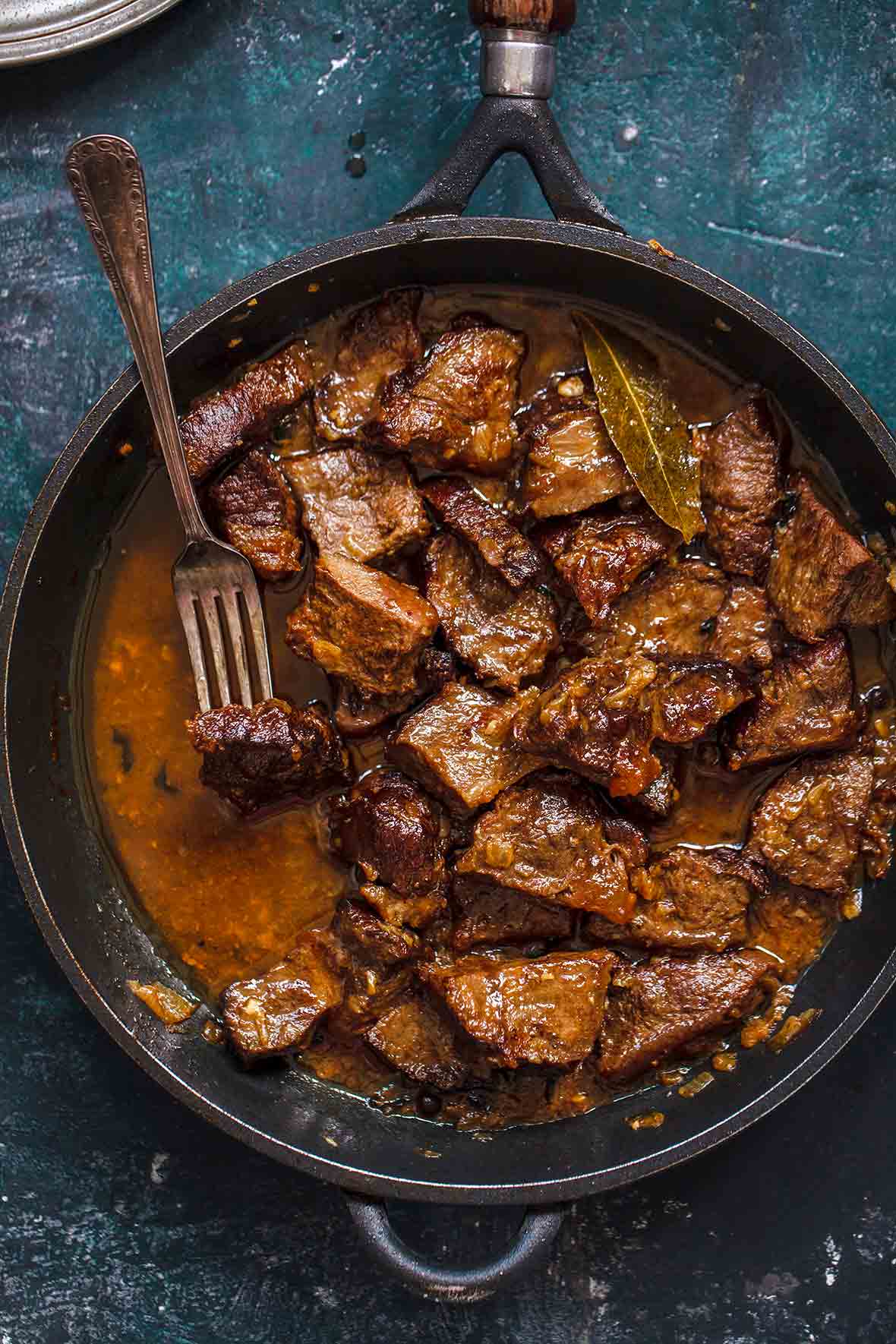
I hesitate to share this Portuguese stewed beef recipe because there are countless versions of caçoila [traditionally ka-soy-la although some folks say ka-sir-la]. They vary in the type of meat (most versions call for pork butt rather than an inexpensive cut of beef that needs to be slowly braised) and means of serving it, whether in a bowl or on a sandwich. So I’m fearful someone will take umbrage. But I couldn’t not share it.
The dish is named for a caçoila, a large clay pot in which this dish is often made. Traditionally the pot is soaked overnight. The next morning the ingredients are added, then the pot is covered and placed in a very slow oven [250°F (120°C)] until the meat is tender. This is a stovetop version that my recipe testers quite literally devoured. This particular beef recipe comes from a friend on the island of São Miguel, a far neighbor of Pico in the Azorean archipelago.–David Leite
Want to Save This?
*How To Make Your Own Crushed Red Peppers
And now, a word from the author on creating your own crushed red peppers. “Crushed red peppers are exactly that: red peppers that have been ground. Once processed, some Portuguese families, like mine, brine them, others prefer to add olive oil and salt to preserve them. If you can’t find bottled crushed red peppers, you can make your own: Remove the stems, but not the seeds, from 2 or 3 large medium-hot red peppers. Place them in the bowl of a food processor fitted with a metal blade. Add 2 tablespoons of olive oil and 1 tablespoon of salt. Whir until blended.” There you have it.
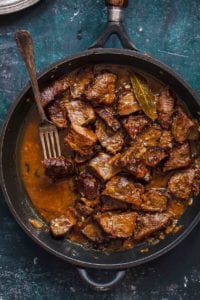
Caçoila | Portuguese Stewed Beef
Ingredients
- One (4 1/2-pound) chuck roast, cut into 2- to 3-inch (5- to 8-cm) chunks
- 2 tablespoons crushed red peppers, (see LC Note above), or more to taste, or 1/2 teaspoon crushed red pepper flakes
- 1 large (9 oz) onion, cut into slices
- 1 bunch parsley, coarsely chopped
- 6 to 8 cloves garlic, smashed and peeled
- 2 bay leaf
- 1/2 teaspoon allspice berries
- 4 whole cloves
- Kosher salt, to taste (optional)
- 3 tablespoons (1 1/2 oz) unsalted butter or lard
- 2 cups hearty red table wine
- 2 tablespoons store-bought or homemade tomato paste
- 1/2 teaspoon ground cinnamon
For serving
- Boiled white potatoes, (optional)
- Roasted red peppers, (optional)
- Cooked greens, (optional)
Instructions
- The day before cooking, in a large bowl, coat the beef with the crushed red pepper, cover, and refrigerate overnight.
- About 4 hours before you intend to sit down at the table, scatter the onion slices, parsley, garlic, and bay leaves in the bottom of a Dutch oven. Tuck the allspice and cloves in a piece of cheesecloth tied together with kitchen twine or in a tea ball and toss them in the Dutch oven. If desired, season the beef with salt. Place the beef on top and dot with the butter or lard.
- In a measuring glass or bowl, stir together the wine, tomato paste, and cinnamon and pour it over the beef.
- Bring the mixture to a boil, reduce the heat to a very gentle simmer, cover, and cook until the meat is very tender, 3 to 3 1/2 hours, turning the pieces occasionally. For a more stew-like version, keep the lid on for the duration of cooking. For a more concentrated, glaze-like sauce version, about halfway through cooking, remove the lid to let some of the liquid evaporate so the sauce can concentrate in consistency and flavor.
- Remove the bay leaves and the cheesecloth pouch or teaball. If desired, serve the caçoila with boiled white potatoes, roasted red peppers, and cooked greens.
Notes
PORTUGUESE STEWED PORK
You can use the same amount of pork butt cooked in the same manner.
An LC Original
View More Original RecipesExplore More with AI
Nutrition
Nutrition information is automatically calculated, so should only be used as an approximation.
Recipe Testers’ Reviews
This Cacoila was divine! The meat was utterly silken and succulent. If I had cooked it beyond the 3 1/2 hours, it would have shredded apart (and turned in to a different but still delicious dish), but as it was, the cubes of beef kept their shape nicely. I love pressing down on a piece of meat and it just gives in and yields to the pressure of the fork; you can tell it’s the perfect texture, reminiscent of a well-braised short rib. The onions, parsley, garlic and spices melted together in the wine braise to create a rich, redolent, and deeply flavorful sauce.
I opted to use lard (because I had just rendered some the other day and wanted an excuse to use it) but I think butter might have lent the dish an even richer flavor (although believe me, there was no shortage of flavor!) I also opted to use crushed red pepper flakes instead of making my own, and no one in my family found it be at all spicy. In fact, next time I make this I will skip the overnight rub with the red pepper flakes, add them directly to the sauce, and up them to 1 teaspoon.
I used a 6 quart Le Creuset Dutch oven, which seemed like the right size, because the cooking time of 3 1/2 hours was on the money. The beef simmered slowly for 2 hours covered, then the last hour and a half uncovered. I got a beautifully reduced sauce that was still plentiful enough to spoon over potatoes and greens. This recipe didn’t indicate any particular amount of salt, and without it, it was flat. So adding a 1/2 teaspoon of Morton’s kosher salt at a time, I found a total of 3 teaspoons to be the right amount. I served this with mashed russet potatoes and escarole sautéed with crushed red pepper flakes, garlic, lemon zest, and olive oil. I think the lemon zest in the escarole added a nice brightness to the richness of the sauce.
This whole dish with the accompaniments was just an explosion of flavor!
This recipe was easy to put together and the results were tremendous! What a treat this meat is. It is super tender and amazingly flavorful. The combination of spices works very well together and it gives the dish a depth of flavor that I have never encountered in a stew. There’s a warmth to this dish that makes it feel like an old friend. I wish I had discovered it sooner.
The only change I would suggest is adding some salt to the meat along with the pepper paste. I found that while the exterior of the cubes was very flavorful, once you bit into them, the interior of the meat was bland. I believe that by adding salt, the meat will draw more of the sauce’s flavor into the inside of the chunks. But for this, I would have rated this recipe a 10!
I made this caçoila recipe in the Crockpot and with pork in place of beef. It was a big hit! All that was left after the feeding frenzy were 2 bay leaves at the bottom of the pot.
I did have to double the recipe as I was cooking for a crowd. I trimmed the pork of any visible fat and cut it into 2-inch cubes. I didn’t have enough hot peppers to double the recipe, so I used half sweet red peppers and half hot peppers. I followed the recipe as written, except for keeping the red wine to only 2 cups. I made the pork and pepper mixture the day before and let it marinate for about 12 hours. It all cooked in an 8 1/2-quart crock pot for about 8 hours. I skimmed any fat from the top and served this with mashed potatoes.
I found that the mixture of sweet and hot peppers made for a very flavorful pork that was not overpowering with heat but with just a slight bite. I would do this again in a smaller slow cooker but decrease the wine to only 1 cup.
I cannot believe this caçoila was the very first recipe from the Azores that I’ve made. But after trying this, I will venture into other ones. Do you enjoy your food spicy and filled with taste? Then this dish is perfect for you.
My husband, our new Thai daughter (exchange student), and my teen all loved it. It was a tad too spicy for my toddler, who usually likes a little heat. The final taste with the tomato paste, wine, and garlic was just absolutely perfect and tasted wonderful. It’s easily enough for 8 people and can perhaps even be stretched to serve 10. We served it with white rice, which was a perfect combination. Extremely easy to prepare, but you must enjoy spicy food. The next day, I decided to warm up the caçoila again, but I served it as an appetizer with toothpicks and bread and our guests also enjoyed it quite a bit.
This was a tasty beef stew. I used red pepper flakes and wished I had used something with a little more heat. I also wasn’t sure that putting the flakes on the meat the night before did too much for the flavor and would be more important if you were using crushed red pepper. I enjoyed the profile of allspice, cloves, and cinnamon in the broth. I cooked it with the lid on. I would definitely add some salt. I served with diced roasted sweet potatoes.
I picked the recipe because I was intrigued by the addition of peppers. After reading the note regarding the peppers, I used Calabrese Peperoncino by Cento, which seemed to fit the description exactly.
I sautéed the onions in a tbsp of olive oil before adding the other ingredients and then followed the recipe as written. This made a great winter Sunday dinner with boiled potatoes, green beans, and a loaf of bread. The beef was spicy but not excessively hot and the addition of cinnamon, cloves, and allspice added a very nice flavor to the stew.
I used Malbec wine. I left the lid on for the entire cook time. We like having extra sauce. Even so, the sauce was thick and very flavorful.
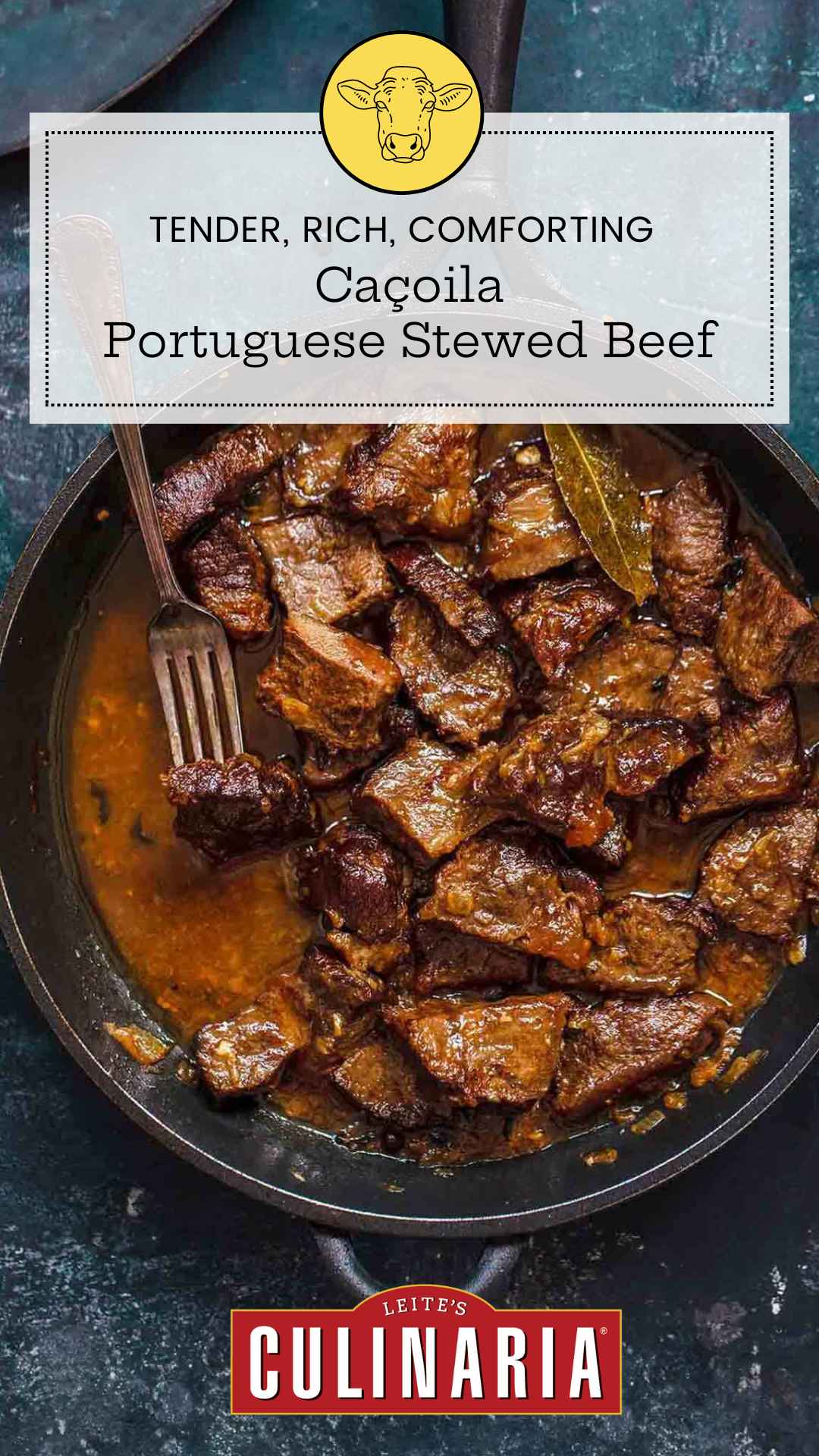
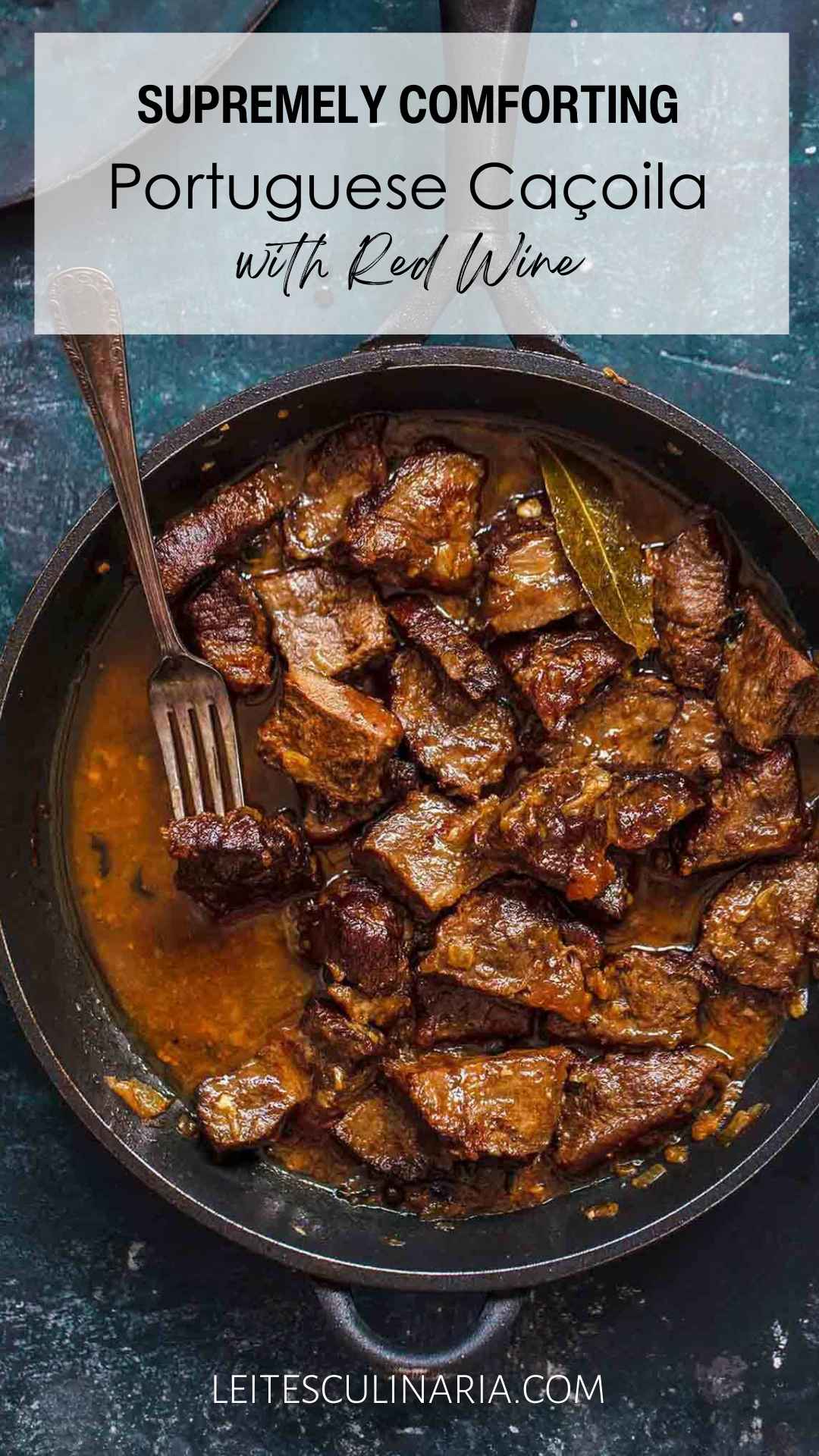
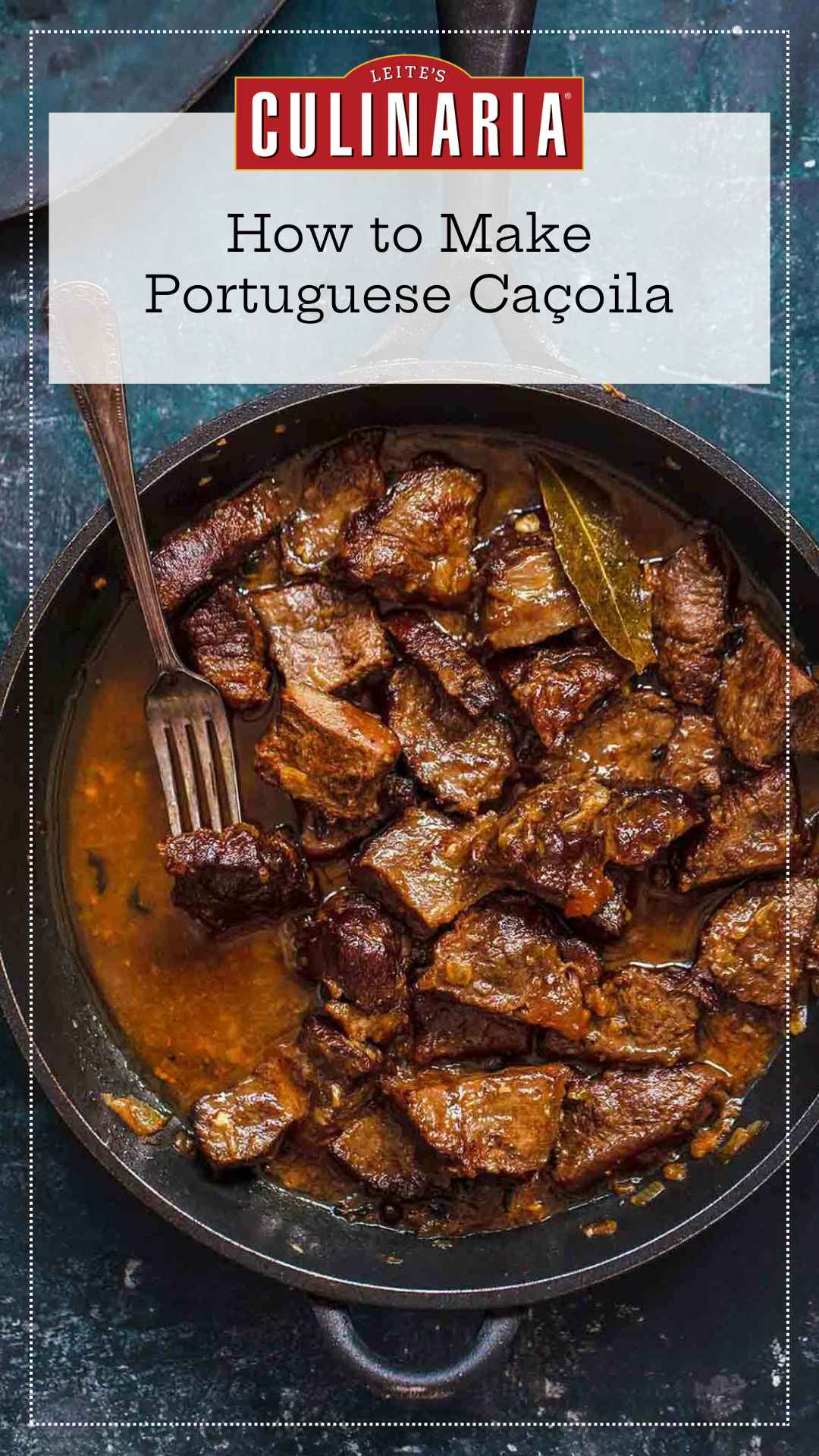
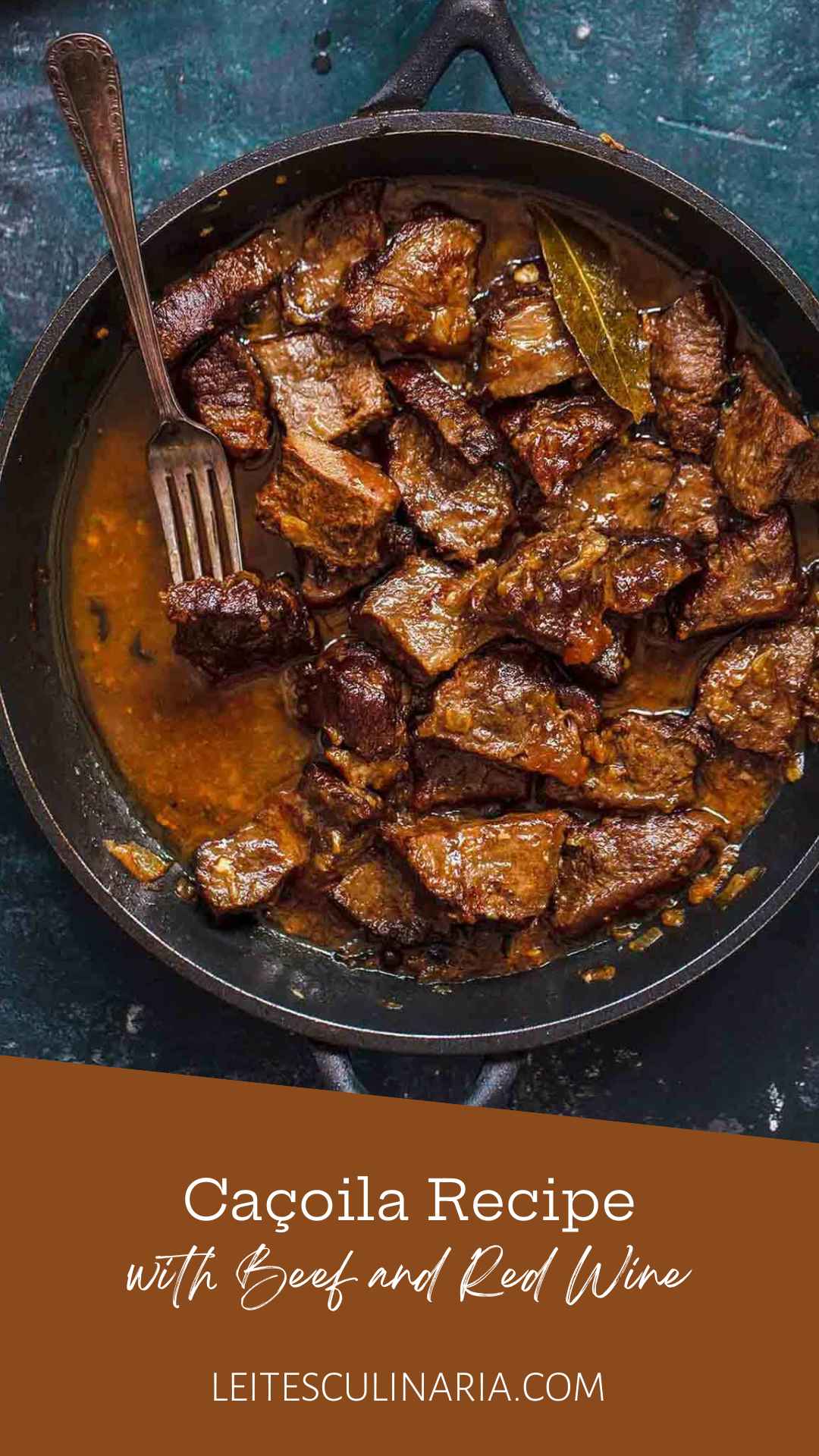
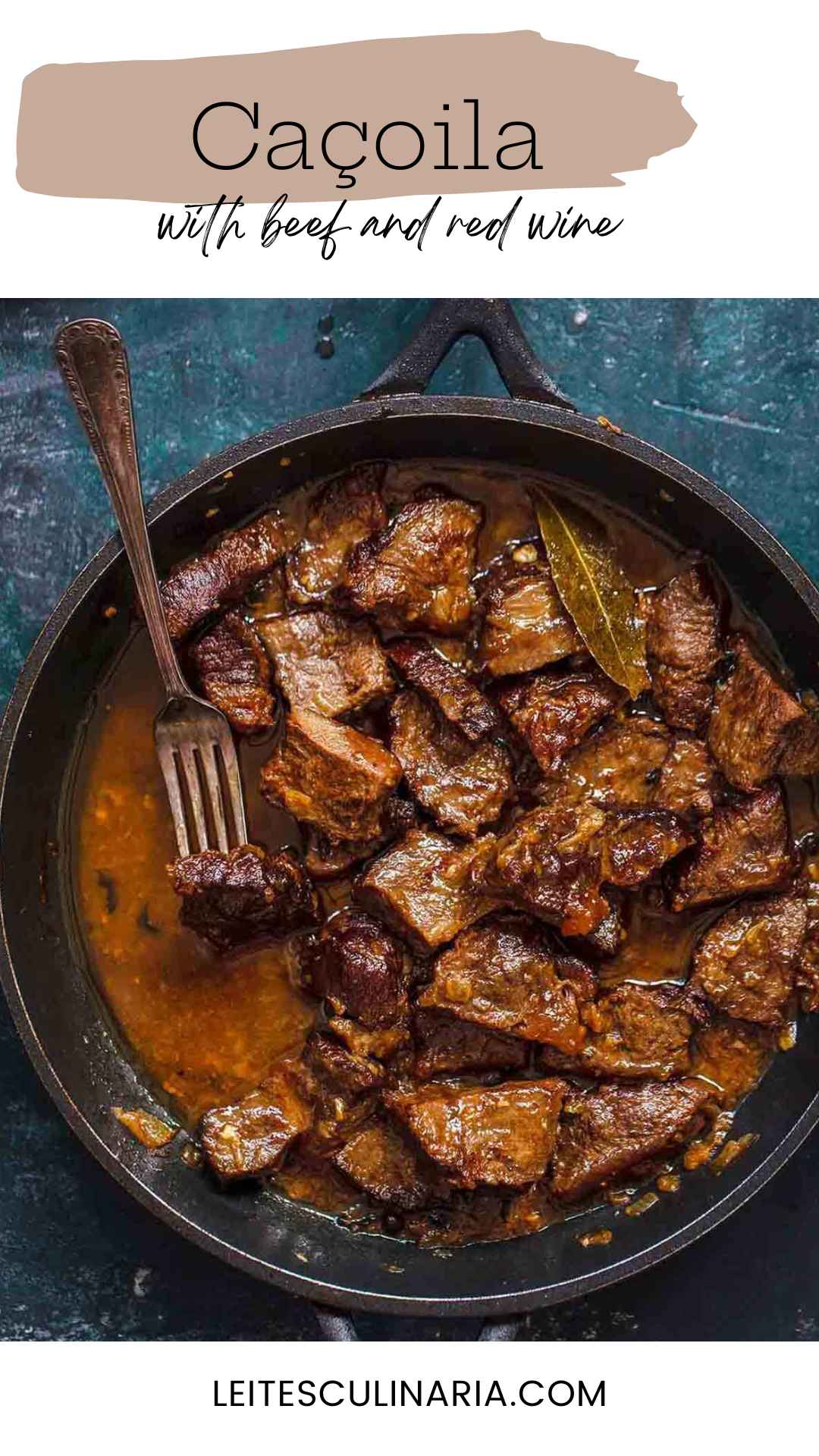
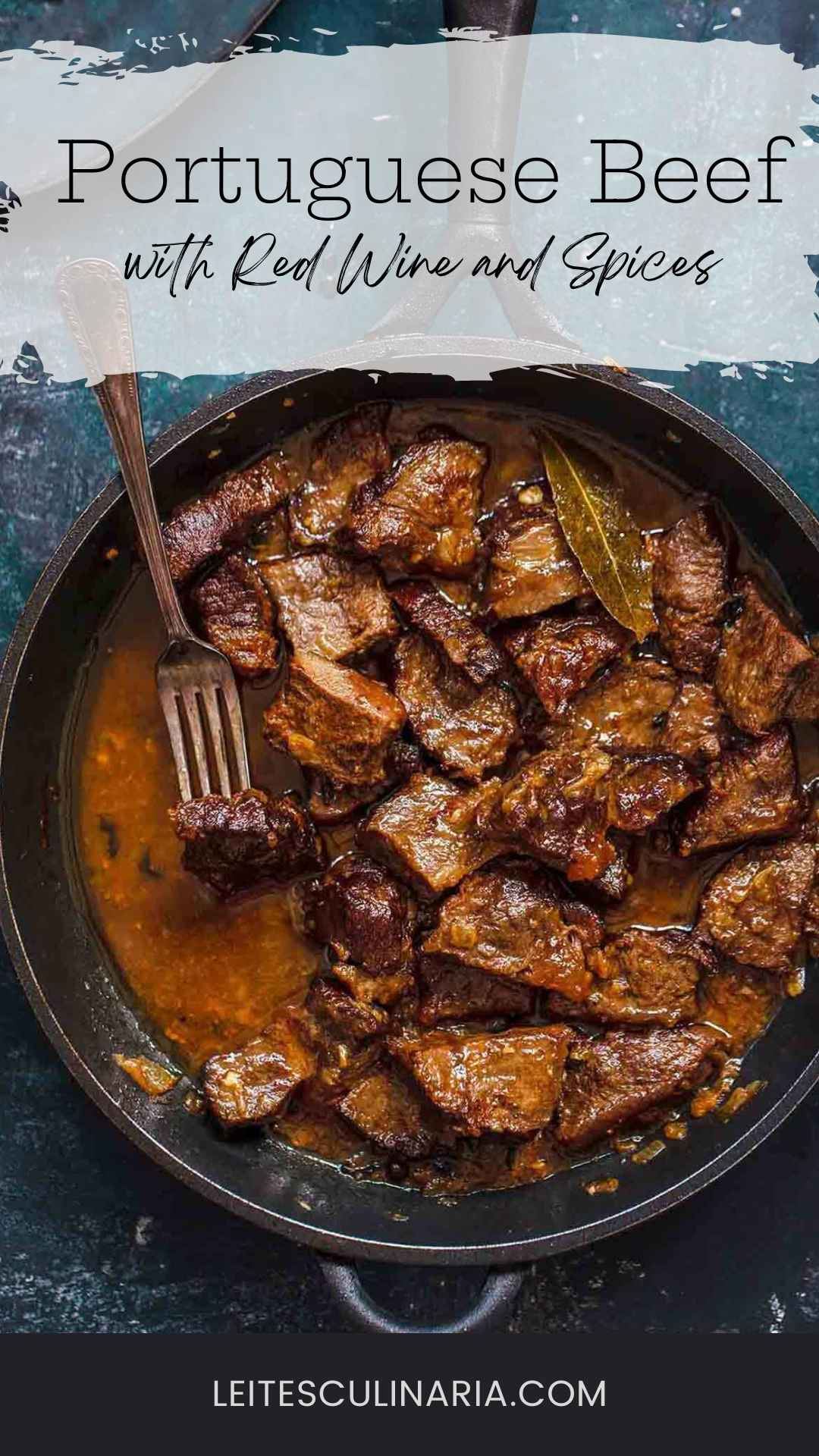














Hey David, hope you and the ONE are having a good day today. I was wondering, since I love the flavors going on here, that since the note says that it woud work with a pork butt, I’m thinking this would work with the boneless pork shoulder I have defrosting right now? and since it’s boneless, I was thinking, I should trim some fat off of it and tie it up like a roast?
thanks
Hi, Lisa. To create a pork version of this, it should be chunks of pork rather than a trussed whole shoulder. Or are you thinking of roast the should with this as a basting liquid?
yes! you read my mind. Sorry if I wasn’t clear on that. I’m thinking a Portuguese version of classic pot roast using the liquid as a braising liquid and marinade. I have my beautiful, fatty, pork shoulder, which I was pleasantly surprised to find that there is a bone after all, yay more flavor, sitting in a bowl covered in plastic wrap, since last night. Can’t wait to get my dutch oven going, I’m going to first remove it from the bowl, brown it nicely, remove from the pot, put on a plate covered with foil, then carmelize some onions and garlic cloves, possibly throw in some shallots in the same pot, and then throw it all together back into the dutch oven with any drippings from the plate, add the wine and then into the oven covered to braise. I’m thinking that this is interchangeable and using an actual beef chuck roast would work as well. To be continued…
Lisa, now I’m intrigued. Let me know how it goes! And take photos.
It worked very well if not better, with pork. Fork tender, melt in your mouth. I can’t believe what great flavors I got from this. I didn’t need shallots. I kept it simple and it was delicious. I served with mashed sweet potatoes with a dash of cumin and maple syrup.
lisa, that looks amazing! I’m now going to have to try it.
What would you substitute the wine for if you prefer nonalcoholic?
Sheila, because there is so much wine, I suggest passing on the dish if you can’t use it. Nothing will give the dish the body, depth of flavor, and acidity that are hallmarks for caçoila. Beef stock will add some savory note, but it won’t add the acidity or complexity of wine.